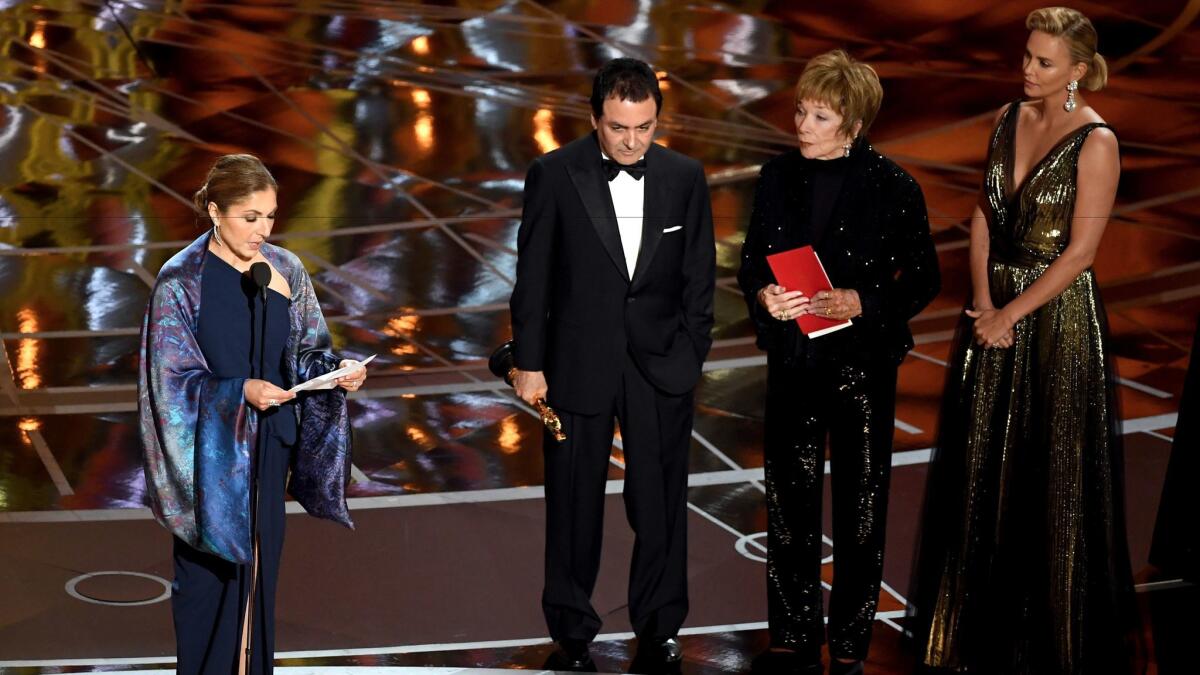Iranian director Asghar Farhadi, who boycotted the Oscars in protest of Trump’s travel ban, wins for foreign film

- Share via
Director Asghar Farhadi won the Academy Award for foreign-language film Sunday night for “The Salesman,” his psychological tale about a young couple weathering the effects of a violent assault. But Farhadi wasn’t present to accept the Oscar.
The director, who hails from Iran, boycotted the ceremony in protest of the travel ban implemented by President Trump in late January targeting travelers from seven countries, including Iran.
Anousheh Ansari, the first Iranian in space, accepted the award for Farhadi and read a short statement from the director.
“My absence is out of respect for the people of my country and those of six other nations whom have been disrespected by the inhumane law that bans entry of immigrants to the U.S.,” Farhadi’s statement said.
The audience inside the Dolby Theatre in Hollywood greeted the statement with enthusiastic applause.
“Filmmakers can turn their cameras to capture shared human qualities and break stereotypes of various nationalities and religions,” Ansari continued. “They create empathy between us and others. An empathy which we need today more than ever.”
In most years, the foreign-language film category at the Oscars can be a sleepy one — Hollywood’s obligatory nod to the large body of cinematic work produced globally. The most notable foreign-language Oscar moments in recent years include Roberto Benigni’s dramatic traipse to the stage after winning the award for “Life Is Beautiful,” and Pedro Almodóvar’s deliriously incomprehensible acceptance speech for “All About My Mother” in 2000.
But this year, the category became a fraught locus of politics after the implementation of Trump’s travel ban. Farhadi announced that he would not attend the awards ceremony — even if he were granted an exemption from the ban.
In a statement, he condemned “the unjust conditions forced upon some of my compatriots and the citizens of the other six countries trying to legally enter the United States of America.”
On Friday, the five directors nominated in the foreign-language film category — Denmark’s Martin Zandvliet (“Land of Mine”), Sweden’s Hannes Holm (“A Man Called Ove”), Germany’s Maren Ade (“Toni Erdmann”) and Australia’s Martin Butler and Bentley Dean (“Tanna”) — issued a joint statement that expressed their “unanimous and emphatic disapproval of the climate of fanaticism and nationalism we see today in the U.S.” and dedicated the award to all the “people, artists, journalists and activists who are working to foster unity and understanding.”
Regardless of who wins the Academy Award for best foreign-language film, “we refuse to think in terms of borders,” the statement said. “We believe there is no best country, best gender, best religion or best color.”
Though the travel ban was later halted by a federal judge, Farhadi nonetheless stood by his decision to boycott the ceremony. He sent two prominent Iranian Americans in his place: Ansari and Firouz Naderi, a former NASA director for solar system exploration.
Farhadi remained in Tehran but remained highly visible.
He made a remote video appearance in London via video link just hours before the Oscars ceremony at an outdoor screening of “The Salesman,” organized by London Mayor Sadiq Khan and filmmaker Mike Leigh. The screening, a gesture of solidarity with the Iranian director, drew 10,000 people.
In the message delivered to the crowd, Farhadi said: “I hope this movement will continue and spread, for it has within itself the power to stand up to fascism, be victorious in the face of extremism and say no to oppressive political powers everywhere.”
Backstage at the Oscars on Sunday, Naderi was asked why he thought Farhadi had chosen Ansari and him to accept the Oscar.
“She’s an astronaut. I work for NASA. If you go away from the Earth and look back, you don’t see any of the borders,” he said, adding later: “I think he chose the both of us to say ‘come together.’ ”
Contributing to this report was Times staff writer Tre’vell Anderson.

Sign up for our weekly Essential Arts & Culture newsletter »
More to Read
The biggest entertainment stories
Get our big stories about Hollywood, film, television, music, arts, culture and more right in your inbox as soon as they publish.
You may occasionally receive promotional content from the Los Angeles Times.










